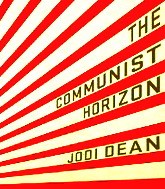
«The only way to confront the far right is a strong left, a left that rejects nationalism, patriarchy, ethnocentrism and offers the solidarity of all working people against the capitalist class»
18.05.2013
- How do you perceive the very of concept of communism applicable to the 21 century?
- Communism is more important for us now than ever before as a name and ideal for emancipatory egalitarian political and economic arrangements. The global grip of capitalism, as well as its destructive force, is more apparent in this age of capitalist globalization. Becauseof the interconnections of global finance, financial crises aren't confined to one country or region. Similarly, because of containerization and just in time production, ever more people depend on goods produced very far away from them.
The capitalist economy is more deeply and extensively global than it was a hundred years ago. This is driving down the wages and living standards of ever more people, dramatically increasing inequality, and destroying the planet (as we see with climate change). Voices from different perspectives speak of anti-capitalism -- even capitalist magazines like Forbes and Time note that capitalism is in crisis. But communism is the name for a positive, egalitarian, alternative. How we can realize this alternative, as well as what it takes to get there, is the project of 21st communism.
- Could you please tell our readers about your own experience of participating in the «Occupy movement»? Could such a movement be developed into something greater and broader movement? What are the lessons that one can derive from the experience of «Occupy»?
- «Occupy» can be summed up in terms of three basic ideas. First, division -- the division between the 99 percent and the one percent. This is the anti-capitalist core of OWS, the class conflict that has been suppressed in mainstream US politics for a long time. Second, process -- this is the consensus idea that was important for the movement getting off the ground. All decisions were to be reached via consensus, at first of everyone and then, as this became too difficult, of ninety percent of the participants. Third, inclusion -- everyone was welcome, everyone would be heard. The problem Occupy encountered was the clash between these three ideas. There was never a list of members or specific «signing up» for OWS. Anyone who wanted to participate was encouraged to.
The problem, though, was that there were no structures of accountability, no way to insure that ideas would be carried out. People could show up for a discussion to block someone else's idea and then not do anything themselves. Or people could push through what they thought was a good idea and there wouldn't be enough people to carry it out. Ultimately, the lack of procedures and clear lines between who was a member and who wasn't made it very difficult to build a strong oppositional force --especially given the enormous push back from the police.
So the broadness of Occupy was one of the problems it encountered as a movement. It could spread quickly because of this broadness but this also meant it spread shallowly rather than deeply. A key lesson of this experience, then, has been the need for more organizational structure.
- How do you see the phenomena of the ultraright right rise over Eastern Europe and post-soviet countries? How it should be confronted?
- The rise of the ultra right isn't surprising -- this is always what happens when the left is weak. That is, opposition to increasing inequality and decreasing life chances (so, rise in unemployment, decline in standards of living) has to manifest itself somewhere. The mainstream parties in Europe and the post-Soviet countries don't provide political expression of this opposition. Instead, they offer more of the same, austerity and hard work and a shift ever rightward. At best they throw up some platitudes about participation and democracy, obscuring the fact that contemporary states are beholden to banks and investors (the notorious troika of the European Central Bank, IMF, and EC). The only way to confront the far right is a strong left, a left that rejects nationalism, patriarchy, ethnocentrism and offers the solidarity of all working people against the capitalist class.
- Could you please tell us how did you personally come to Marxist views? Does modern academia discourage Marxist or communist views?
- I studied the Russian language while at university in the eighties. I visited the USSR in 1984 and 1986 (and very much enjoyed going to Kiev during the first trip). I came to Marxism, then, in connection with learning Russian. Marxism seemed to me just to be correct, not controversial, just true, although I recognized that the struggle against capitalism was going to be long and difficult.
As a graduate student, I encountered post-structuralist and postmodern critiques of Marxism, various versions of «western» Marxism, post-Marxism, and neo-Marxism. For a while I worked in and through these approaches, until finding my way back into an idea of communism that made sense as a horizon rather than an orthodoxy.
With regard to academia: this is a hard one because, on the one hand, anything is allowed; on the other, the job and publishing markets are so competitive, that all sorts of work gets rejected so that it hard to say whether it is rejected for explicitly political reasons. Marxism has been unfashionable in the academy for the last thirty years --not coincidentally the years of the triumph of capitalism and the end of the socialist experiment in Europe. Because of the courage and brilliance of thinkers who have continued to think as communists (Alain Badiou, Michael Hardt and Antonio Negri, Fredric Jameson, Slavoj Zizek), an intellectual space has remained. Also, publishers like Verso and Haymarket Books have consistently provided an outlet for Marxist writing, as have journals like Historical Materialism.
- What are the main challenges for modern lefts regarding the ongoing financial and economic crisis?
- Two challenges: one, not to get swept into constant reaction, that is, into thinking only immediately. Politics in the US is only reactive. It is always in crisis mode, thinking in terms of emergencies. If the left focuses only on crises, we simply repeat this emergency mindset. The real challenge, then, is to think more systematically and long term. One particularly notorious Republican, Paul Ryan (he was the vice presidential candidate in the 2012 election) has a 10 year plan for shrinking the federal budget. This plan basically eliminates every social program and increases the coercive power of the state. The left needs to think more systematically -- what would a 10 year plan for us look like? Second challenge: organization. Organization is everything. If we remain separate, speaking as individuals and active as local groups, we will remain weak and divided.
- What do you think about potential strength of modern trade-union and left movements worldwide?
- In the US, the trade union movement is very weak. We are at our lowest level of union membership in eighty years. There has been a systematic attack on unions, with the recent bailout of the auto companies a kind dagger in the heart of the movement. In the past year there has been some interesting movement toward organizing fast food workers. Organizers are using mini flash strikes -- this lets workers strike without losing too much pay. It remains to be seen if this will be a kind of 'striking without striking' or rather it's a tactical advance. There has been increasing worker militancy in China, which we should expect to continue and increase.
- Has the development of social media changed people’s attitude to capitalism?
- Social media has been a vehicle for embedding us more deeply in capitalism -- people want iphones. A problem on the left has been the assumption that social media provides new tools for revolution, as if only radicals used the internet. It's quite destructive for the left to think this way insofar as it obscures the more fundamental embeddedness of our activities in communicative capitalism. Google profits, Facebook profits, and leftists build another page that 350 can feel radical for liking. That said, the positive potential is in the building of commons within and against capitalism. V-Kontakte (the Russian social media site) is great for its provision of an intellectual common of books.
- What does the concept of «the commons» mean for you?
- «Commons» designates a resource that is necessary but scarce. In other words, a commons isn't something that everyone can use as much as they want without negative repercussions. Our relation to it has to be managed. Examples would include air, land, and water. Emphasizing the commons is important as a push back against capitalism insofar as capitalism wants everything to be marketizable and sellable to the highest bidder. As we emphasize the commons, we carve out spaces that we want to extract from market logics.
The related concept is the «common» which is characterized by abundance rather than scarcity. So, digital media products, language, communication, affects, waste (garbage) -- these can be understood as common. And, the way that they are common can highlight both a positive potential -- the limits of property, say -- as well as a negative one: infinite digital products, but limited time; or, immeasurable waste, but no place to put it. With these concepts of the commons and the common, we can begin rebuilding a notion of communism for the 21st century.
- What do you think about class struggle? Is this concept still relevant today?
- Yes. It's crucial. Without it, we can't demonstrate the domination of the capitalist class. What's important, though, is making sure that we don't resort to flat, empirical notions of classes as if
they were fixed entities. Struggle produces classes. So, the resurgence of the capitalist class since the end of the 70s has produced a larger working class; it has led to the proletarianization of ever more people as their declining wages have been supplemented with debt, which makes their lives ever more dependent on waged employment, the opportunities for which are decreasing.
- As far as you visited post-soviet countries, has such an experience made an influence on you views?
- I've been particularly struck by the failure of the US, UK, and western Europe to learn from the socialist experiments. It's like there has been a deliberate effort to obliterate the experience
of trying to build egalitarian societies. Full fledged capitalism, privatization, and all the theft and impoverishment that result from it was unleashed with no regard to preserving the best attributes of the socialist systems. Both materially and conceptually, these countries have been taken over by capitalism and in the name of democracy. Why the rush? Why the attempt to obliterate history?
I think it was because of capitalism's deep fear of the people, its attempt to buy people off with some quick goodies, divide them from one another, and all before people have time to think about what is going on and undertake new political experiments. To my mind, some of the most important work that needs to be done is compiling histories, testimonies, archives of the socialist experience with an eye toward asking what worked and why? Where did problems arise? Too much of that history was totally distorted by the Cold War.
- Could you wish something to our students and left activists who try to oppose neoliberal capitalism?
- Organize. You are stronger collectively. Draw from the communist legacy. Don't fall for trendy anarchist rhetoric that is just another form of capitalist individualism.
- Can you imagine our world in 10, 20 or 50 years? How do you see it?
- You know, at the beginning of the Bush administration, I was lamenting about how bad things were going to be. I had no idea. Reality has been much worse than I imagined -- Guantanamo Bay prison camp, indefinite detention, torture, a security state, the dramatic increase in inequality, collapse of basic infrastructure. The same with Obama -- I knew he wasn't a liberal or a progressive (much less a communist that the Right accuses him of being). But I didn't think he would be the president of the big banks, the savior of Goldman Sachs and the president to attempt to make cuts in the most popular and successful social program in the US, Social Security. Yet I also didn't foresee Occupy Wall Street, which has been the most exciting development on the US left since 1968.
So it's like things get worse, but new possibilities appear. That's what I expect will continue. Inequality will continue to get worse, yet the left will build a new global communist party stronger and more flexible than anything we've ever seen. Our Communist International will exert a counterpower with which the IMF, European Central Bank, World Bank, and others will have to contend. It will unite workers and non-workers throughout the world and make our collective force felt. To paraphrase Mao, everything will be in chaos, yet the situation will be excellent.
Kolesnik Dmitry
Russian translation: «Десятилетний план» для левых
-
Історія
Африка и немцы - история колонизации Намибии
Илья Деревянко история колонизации Намибии>> -
Економіка
Уолл-стрит рассчитывает на прибыли от войны
Илай Клифтон Спрос растет>> -
Антифашизм
Комплекс Бандеры. Фашисты: история, функции, сети
Junge Welt Против ревизионизма>> -
Історія
«Красная скала». Камни истории и флаги войны
Андрій Манчук Создатели конфликта>>
occupy | європа | імперіалізм | азія | арсенал | африка | близький схід | блюмінов | буткалюк | відео | війна | валерстайн | венесуела | влчек | воронов | гетто | греція | грук | деревянко | екологія | жадан | жанаозен | живопис | жижек | змі | кіно | кавказ | кагарлицький | киричук | кирпиченок | клерікалізм | книги | колесник | корбин | криза | лібералізм | ліві | латинська америка | латиш | лебский | міхєєва | малькіна | мандри | медицина | мовчан | музика | нацизм | опортунізм | орленко | освіта | пам`ять | панов | поезії | політики | постать | проза | профспілки | райдер | расизм | рецензія | роос | рудь | сахнін | скрипник | солідарність | спорт | срср-ex | сутырин | сша | тарік али | трудова міграція | україна | філософія | фемінізм | фетва | фото | харві | хомський | цвєтков | чілі | чапай | чемерис | шапінов | ясинський













 RSS
RSS





